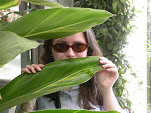
 Please forgive the less than fantastic images. These were taken with my cell phone. The plant you are squinting at is Phal. mannii v. flava (this plant is for sale - click here), a variety of the species mannii that does not produce the red pigments, most likely a carotenoid pigment, but I'm not sure. If you look closely at the actual flower (in person), you can still see the markings where the red pigments belong. The leaves also are devoid of any red pigmentation.
Please forgive the less than fantastic images. These were taken with my cell phone. The plant you are squinting at is Phal. mannii v. flava (this plant is for sale - click here), a variety of the species mannii that does not produce the red pigments, most likely a carotenoid pigment, but I'm not sure. If you look closely at the actual flower (in person), you can still see the markings where the red pigments belong. The leaves also are devoid of any red pigmentation.This is my office window in Baltimore, MD, facing due west. I also currently have there a Dischidia ovata (almost always with buds or flowers), Clivia manata (in the darker corner), Dend. Maiden Charlotte, and a equitant oncidium in the brightest corner for the cold season only - that will go outside at the earliest opportunity.

2 comments:
I have an interest in getting a plant, but have not had good success with orchids in the past. Grew cymbidiums for many years on an unheated, but enclosed porch with very good success, but since we moved haven't got very good light. Mother gave me three phals a couple of years ago all in beautiful bud, but every bud dropped off in about two weeks and no blooms. I think it may be that we burn a gas fireplace in the winter - well, fall thru spring - and I am thinking that it may be the GAS, rather than the heat. Got any thoughts on that? Am not sure I want to make the plunge again until I have better conditions...
this plant is lovely and got me in the mood again! thanks.
Bud drop can be caused by a number of things. I have heard that it can be caused by exposure to unburned gas, but have never seen it happen and don't know the mechanism, so I'm a bit suspicious. Natural gas is mostly methane. I don't think there are any plant mechanisms associated with methane. Perhaps if there is some ethylene in there, though, that would be cause sudden bud drop at certain concentrations.
Anyway, in addition to hearing about this possible sensitivity, I've heard there are some plants that are more resistant to it, but am no longer sure which those would be. However, if this is in fact the case for your plants, I'd be more concerned about a leak somewhere.
Regardless, if there is in fact an environmental issue in the winter at your house, I'd suggest you select something likely to bloom in the summer instead.
What happened to those phals? Did they grow for you or did they end up in new homes?
Post a Comment